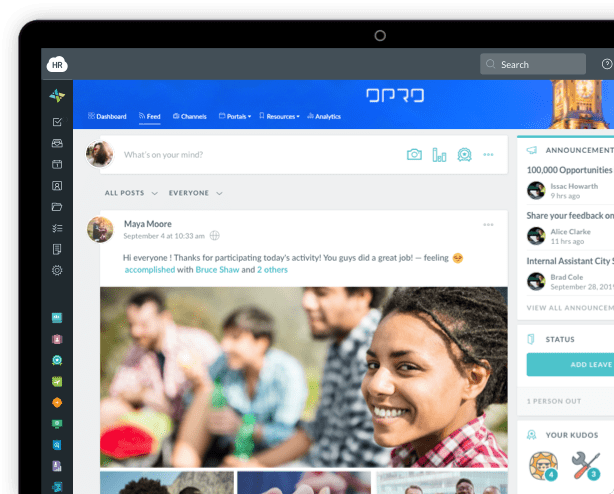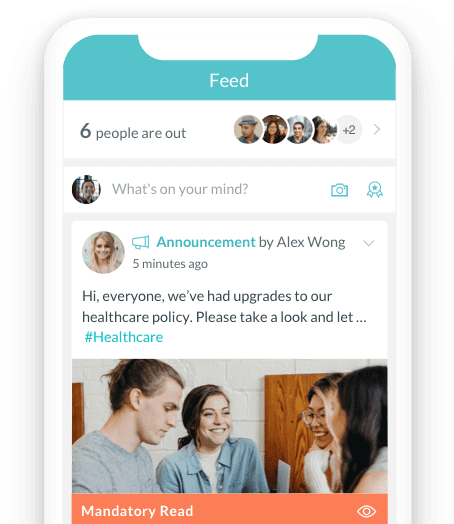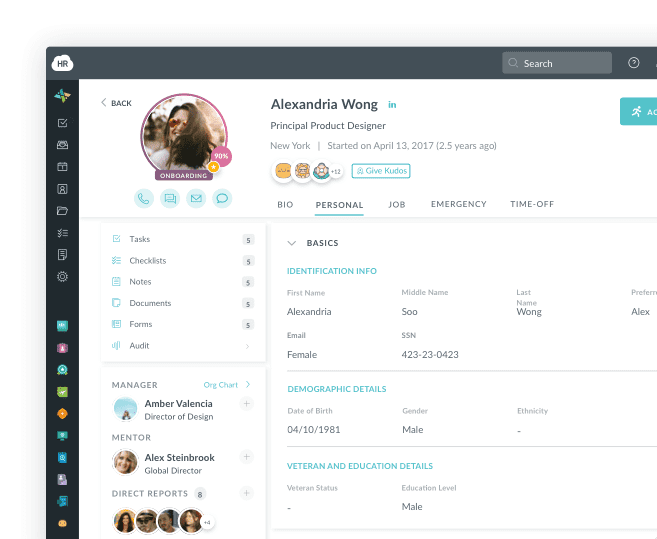What do human resources information systems (HRIS) do, and what benefits do they provide? More importantly, what factors should you consider when evaluating the many HRIS systems and vendors to find the one that’s right for you?
It can be a confusing landscape to understand and navigate. To help, we created this blog article to break down HRIS systems. We’ll present an overview of HRIS software, describe what today’s solutions can do, highlight the many benefits they provide and list the specific features and capabilities you should consider to make the right choice for your company.
What is an HRIS?
HRIS stands for human resources information system. It is a software solution designed to give HR departments a better way to automate, streamline, and manage vital processes related to HR, business, and employee data.
HRIS systems successfully overcome challenges long associated with many siloed systems and databases: redundant data management practices, inaccurate data, wasted time and effort, and a lack of real-time insight into key workforce trends and business drivers.
While each HRIS is different, most now include comprehensive functionality (or integrations) to additional HR areas to manage all phases of the employee life cycle. Many leading HRIS solutions now include:
-
Applicant tracking systems (ATS) to attract and track top talent through the hiring process and improve hiring metrics, such as time-to-hire and time-to-fill.
-
Onboarding systems to give new hires all of the information they need, often before they even start. This streamlines traditionally cumbersome processes and makes sure employees can hit the ground running on day one.
-
Time and attendance to enable employees to clock in/out and help the company manage their time for payroll and compliance.
-
HR and benefits administration to monitor employees’ benefits selections and easily manage the entire administration process.
-
Performance management solutions to improve employee performance reviews and align their overall efforts with larger corporate goals.
-
Learning management applications to track all employees’ training requirements, including required certifications, skills, and more.

The Benefits of an HRIS
HRIS systems are designed to help HR departments and entire companies improve the way they organize and manage employee-related information. This includes traditional HR data, such as employees’ personal information, job and department data, selected benefits, and payroll. But new HRIS solutions can manage additional information, such as scheduling, time and attendance, social media, and much more.
As a digital tool, HRIS solutions automate HR processes that were once manual or paper-based, such as collecting and storing paper onboarding forms or calculating employees’ leave balances by hand. Now HRIS systems successfully reduce, even eliminate, HR’s burden. They also free HR teams to spend much more time on higher-value tasks, such as developing valuable company-wide training programs, aligning the workforce against a corporate goal, and creating new reports to ensure compliance with new regulations.
All of this information is stored in a single, centralized software solution. This repository model helps provide easy, consistent access to critical information and serves as a single source of up-to-date, highly accurate employee data. This is an important advantage considering many HRIS platforms now offer powerful reporting capabilities that can provide real-time insight into workforce trends and inform better decision-making.
As HRIS systems continue to expand, they can provide additional benefits that affect virtually every phase of the employee life cycle. For example, HR and corporate teams can improve the way they attract, recruit, and track top talent; hire and onboard new hires; and manage employee performance. These solutions even provide valuable self-service access to vital information such as company announcements, PTO balances and requests, scheduling, and more. This helps increase employee engagement, communication, morale, and productivity.

HRIS Benefits Across the Organization
Even more, HRIS systems provide a full range of benefits for various departments in the organization.
Employees
No one wants to put up with time-consuming, paper-intensive processes or bother HR with requests for routine information, especially when there’s a better way to manage these processes and much more. HRIS systems provide powerful self-service access, usually via a convenient mobile app, to help employees find, access, and manage their own data at all times. Job satisfaction, engagement, and morale all skyrocket, and time saved means employees can now focus on what’s most important: the real work at hand.
HR Executives and Managers
HR managers and executives benefit from having fast, easy access to critical employee and business data. Not only does this save valuable time and effort, but they gain complete visibility into employee performance and workforce trends with dashboards and reports. Armed with this information, they can best align the workforce against critical corporate goals and report on progress. For HR executives and departments who have longed for a seat at the executive table, HRIS systems may provide just the edge they need.
Corporate Goals and the Bottom Line
Research shows that companies with happier, more engaged employees experience higher productivity and financial performance results than those without. HRIS systems can help any company improve overall communication, engagement, and collaboration—even for remote employees. This contributes to top-line revenues and a stronger bottom line.
Take Advantage of E-Forms, Time-Off Tracking, and Other Powerful Features to Help Drive Your Bussines
Learn More about HRMS
What to Look for in an HRIS
When evaluating the different HRIS systems and vendors on the market today, there are many factors to consider, including:
-
Automation: Does this system offer proven workflow capabilities to automate as many different processes as possible? No one wants to be stuck with a disparate system that still requires some level of manual effort. Push for full automation.
-
Scalability: Where your company stands today might not be where it will be next week, next month, or next year. This means you need an HRIS with proven scalability capabilities so it can easily grow with you as you add new employees or require additional functionality.
-
Ease of use: With any enterprise software deployment, employee adoption is critical, and HRIS software is no different. The best systems are well-designed, completely intuitive, and entice employees to start using them (often with mobile capabilities). All of this is crucial to reduce training costs, increase overall use and adoption, and achieve a fast, significant ROI.
-
The employee experience (EX): Similar to adoption, HRIS systems also need to “consider” the entire employee experience (EX) by providing the right tools to communicate, collaborate, and get the necessary information.
-
Security: HRIS software must be able to safeguard employee information. This is especially crucial, as it will contain personally identifiable information (PII), payroll and tax information, and other types of confidential data.
-
Compliance: Finally, HRIS systems should include workflows, built-in tasks, notifications, reporting, and audit capabilities that HR professionals can use to remain compliant with the industry regulations and requirements related to managing employee data.
What Can HR Cloud Do for You?
When it comes to HRIS systems, HR Cloud delivers the solution that’s perfect for any HR department or company. Our People HRIS solution lets you digitize and store vital employee data easily and effectively. Our system of record helps you save time and increase productivity by keeping your employee data organized and accessible. With People HRIS, you gain the insights you need to generate better business results while remaining completely secure and compliant at all times.
To learn more about People HRIS, visit our webpage or register now for a brief, no-obligation demo.
Author Bio:
This article is written by a marketing team member at HR Cloud. HR Cloud is a leading provider of proven HR solutions, including recruiting, onboarding, employee communications & engagement, and rewards & recognition. Our user-friendly software increases employee productivity, delivers time and cost savings, and minimizes compliance risk.
Keep Reading
Retention Reset: How to Keep Your Best Talent in 2025
More employees are walking away from their jobs in 2025 not just for better pay, but for
Remote Onboarding Done Right: A Step-by-Step Guide for HR Teams
Remote onboarding is the process of welcoming new employees who work from home or



